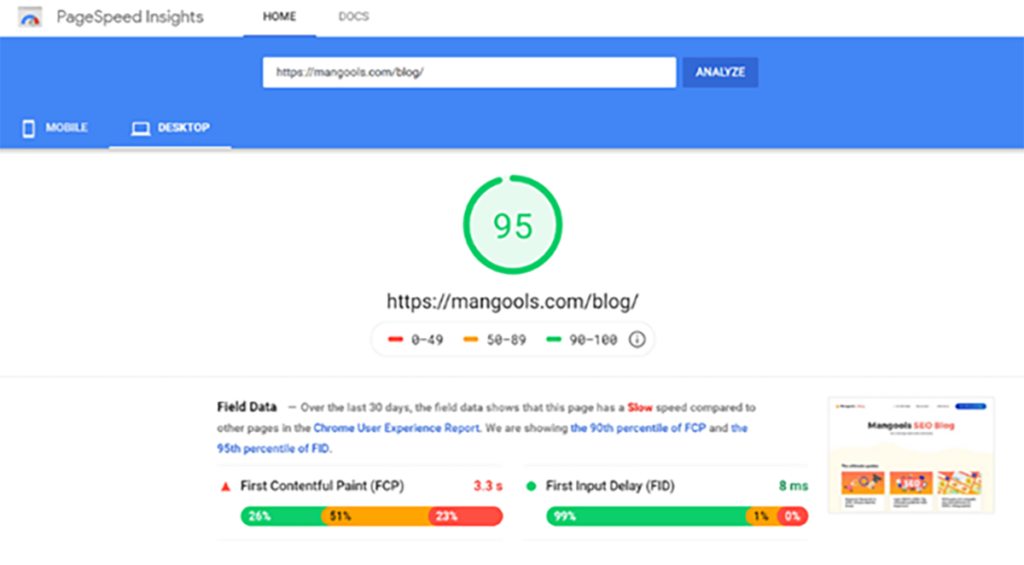
What is web page speed?
The time it takes for a browser to receive the first byte from a web server or for all the material on a given page to be displayed is referred to as web page speed (or, to put it in less technical terms, page speed is how long it takes for the browser to receive the first batch of information from the server).
The HTML code and CSS used to style page elements, different JavaScript files, photos, videos, and other multimedia, among many other things, all have an impact on how quickly a page loads. The size of an element (measured in kilobytes) or the speed of the web server it is housed on can both have an impact on how quickly a page loads.
Both desktop and mobile device page speeds are evaluated individually. Users of desktop computers and mobile devices will have a different experience as a result of the technological variances between the two.

What is an ideal page speed?
Google doesn’t specifically state which “speed” metrics have an impact on SEO. According to this study by Moz, when Google evaluates page speed, it may specifically measure the time to the first byte.
You can check the speed of your test using a Google tool called PageSpeed Insights Tool.
When you run your website using Pagespeed insights, you’ll receive a score between 0 and 100 (higher is better) as well as information about how your site performs in real-world situations based on Chrome Data.


Why does page speed matter?
Because speedier pages are more effective and offer a far better on-page user experience, users place a high value on page speed.
According to a recent Kissmetrics infographic, if a website loads slowly (more than 3 seconds), more than 25% of users would leave and select a different search result. The goal of SEOs is not to make websites bounce more often!
Mobile customers anticipate quick load times as well. In the same survey, 73% of respondents said they had experienced a website that took a long time to load. The conversion rate is also impacted by page speed. For instance, Walmart.com reported that their conversion rate increased by 2% for every additional second of page speed.
However, page speed is equally crucial for search engine optimization, although being may be less intuitive (SEO).
Google revealed in 2010 that one of the ranking variables for their search index would be page speed.
Google declared in 2017 that they will give page speed even more thought, taking into account mobile site speed to rank websites on their “mobile-first” pages, or pages that cater to rankings for mobile sites. A project called Accelerated Mobile Pages (AMP), which aims to make pages load faster on mobile devices, is also being tested by Google.
The search engine included Page Experience in its ranking signals more recently, which increased the significance of the user experience. To develop search signals for the overall Page Experience, this new ranking signal combines Core Web Vitals with already-existing metrics like mobile friendliness and safe browsing.
Page Experience Signals seek to rate web pages according to how well they interact with actual users. In other words, they add elements that influence the user’s experience while consuming the material to Google’s recent on-page criteria.
Page speed is one of the most important things that affect it.

How your server affects page speed?
A slow server is one of the most frequent causes of slow loading times. Additionally, a slow time to the first byte is a clear sign that your hosting service is subpar.
No matter how well-organized your files are, if your host can’t transmit them promptly, your user will experience a slowdown.
People frequently choose the lowest hosting option available without thinking it through, compromising the website’s performance and security in the process.

Factors that Slow Pages Down
You should make sure that your website loads swiftly given these persuading statistics. Consider a few potential reasons why your website can lag.
First, a page with lots of photos may take a while to load, especially on responsive sites with high DPI graphics. Your website can become lighter by optimizing its pictures and delivering them via a content delivery network (CDN) to render assets closer to the user’s location.
If your web page requires the download of an excessive number of huge files, another issue arises.
A page will load slowly if there are too many JavaScript scripts to render. Your download size is reduced using a JavaScript compression or reduction utility.
Does your website make use of server caching? This can reduce your TTFB by keeping copies of your web pages for up to a year for pages that aren’t updated as regularly (Time to First Byte).
The HTML code of the page may contain leftover CSS, JS, or other scripts that will lengthen the time it takes for a page to load.
Too early or too-late rendering of scripts is a serious issue as well. Webmasters frequently build their pages to only be viewed when all of the content has loaded.
However, for the majority of users, simply viewing the material that is above the fold will get them interested in the page. This allows the browser enough time to load the remaining parts of the page (all of which are below the fold) without making the user wait.

Final Words
If a website loads slowly, users may be forced to leave and return to the search results, where they may eventually visit a competitor’s website.
For potential clients to stay interested and continue visiting your website, you must make sure that your website has good hosting as well as fast website performance. With a fast website load time, you can also raise your search engine ranking. I hope you all now understand the significance of website speed.
A web design and development company that offers top-notch online-based business solutions is Velocity Consultancy. Our team of qualified web designers and developers works to position our customers’ businesses at the top of the heap, even in the most competitive markets, to help them generate more leads and increase their sales.



